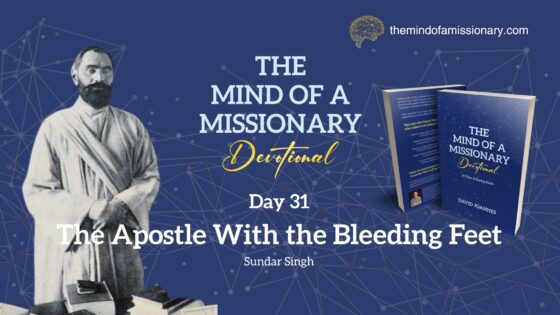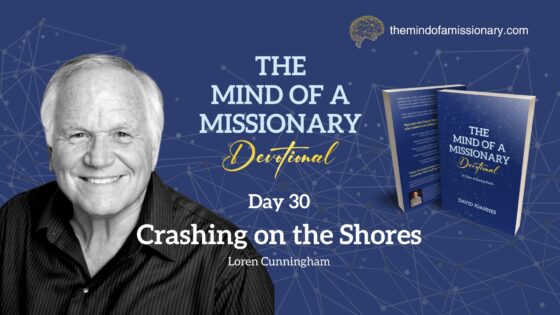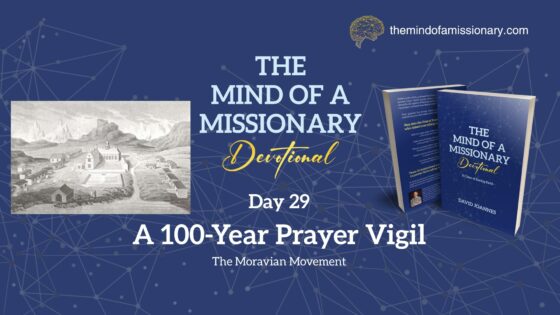Day 1
The Mind of a Missionary Devotional
Heels Over the Golden Wall
Isobel Miller Khun
“But we have this treasure in jars of clay to show that this all-surpassing power is from God and not from us.” — 2 Corinthians 4:7
The Lisu people had hundreds of words that described the most efficient way to skin a person alive, but their ethnic language did not have a word for forgiveness, compassion, mercy, repentance, or justice. The superstitious people group lived in constant fear of spirits, calling on witch doctors to communicate with them and practicing witchcraft to appease the netherworld.
Few missionaries dared the impossible task of taking the Gospel to the Lisu, who lived in the mountainous regions of Burma, China, Thailand, and India. However, a young British man named James O. Fraser was a forerunner in reaching the Lisu. His pioneer work among the tribe in the early years of the twentieth century planted the initial seeds of faith among them, and his passionate call for missionaries to enlist in the battle for their souls stirred the Western world.
“I need men!” Fraser once pleaded at a Bible conference in Washington State in 1924. “Consecrated men, men willing to live a lonely life, willing to suffer, and do without the comforts of civilization.” Many attendees shifted in their seats, but one young Canadian woman responded with courage. Broken-hearted for the tribe living in fear of demons, Isobel Miller said, “I’m not a man, but I’d go! Oh, I’d go!” Her response surprised her companions, who had only recently witnessed a dramatic shift in her lifestyle.

It was the Roaring Twenties, and Isobel was soaking in the exciting social, artistic, and cultural dynamism. In high school and college, her peers described her as cheerful, pretty, intelligent, and athletic; she was also well-known for her skills on the dance floor.
Born on December 17, 1901, in Toronto, Canada, Isobel grew up in a Christian home. Her father was a Presbyterian preacher, her mother the president of the Women’s Missionary Society. However, Isobel turned from her faith, declaring herself an agnostic, and, through a series of difficult days during college, fell into a deep depression. As she contemplated suicide, the words of Dante rushed into her mind as she lay in bed: “In His will is our peace.” Shaken, she prayed, “God, if there be a God, if You will prove to me that You are, and if You will give me peace, I will give You my whole life.” And give her whole life to God she did.
James O. Fraser’s sobering words about the Lisu people sparked in Isobel a newfound missionary zeal. Despite the China Inland Mission’s hesitancy to accept her (one recommendation letter had described her as “proud, disobedient, and resentful”), Isobel departed Canada for Kunming in southwest China on October 11, 1928. After completing language school, she married her Moody Bible Institute sweetheart on November 4, 1929.
The couple spent the next twenty-five years working as Bible teachers, translators, and church planters. They were instrumental in introducing Christianity to the Lisu, helping bring Fraser’s missionary vision to fruition. In 1950, during the communist takeover of China, Isobel and John Khun were forced to flee over the snowy mountainous pass from China to Burma. Yet, despite the political, physical, and spiritual turmoil they faced, they saw tremendous fruit. At the time of their escape, they had been instrumental in leading 3,400 Lisu to Christ, and seven other tribes were evangelized by Lisu missionaries. Today, there are 300,000 Lisu Christians.
“I believe that in each generation God has called enough men and women to evangelize all the yet unreached tribes of the earth,” Isobel once wrote. “It is not God who does not call. It is man who will not respond!” Words like these peppered her nine books, bringing the missionary experience alive to American audiences.
The life of Isobel Miller Khun poignantly encapsulates God’s ability to use broken people for the expansion of His Kingdom. She was not the most likely candidate for overseas missionary work, but her obedience and faithfulness brought the message of salvation to a Gospel-deprived tribe. “When I get to Heaven, they aren’t going to see much of me but my heels,” she said, “for I’ll be hanging over the golden wall, keeping an eye on the Lisu Church!” Isobel labored among the Lisu until her death on March 20, 1957.
God used a willing Canadian woman not because Isobel was flawless, better trained, or less apt to selfishness but because she considered Him worthy of her life and responded in radical obedience. As a result, an estimated 300,000 Lisu Christians no longer live in fear of the spirits but recognize Jesus Christ as Lord today.
– Personal Response –
Passage: But we have this treasure in jars of clay to show that this all-surpassing power is from God and not from us. (2 Corinthians 4:7)
Point: God delights in using ordinary, imperfect people to accomplish extraordinary things for His glory.
Ponder: What part of your life feels too weak or flawed to be used by God? What if that is the very thing He wants to use to show His power?
Prayer: Lord, I offer You my brokenness. Use me, not because I am strong, but because You are. Let my life be a vessel for Your glory. In Jesus’ name, amen.
Proclamation: I will not wait to be perfect before I obey. I will follow boldly, knowing God works powerfully through surrendered lives.
Practice: Write down one area of fear or doubt that holds you back. Then write one step of obedience you can take this week to trust God and move forward in faith.
Learn more about The Mind of a Missionary Devotional at themindofamissionary.com




